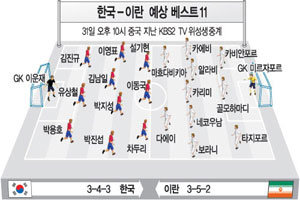Met Again, Iran? Youll Go Home Crying Again!
Met Again, Iran? Youll Go Home Crying Again!
Posted July. 30, 2004 21:52,

0-0 (July 19, vs. Jordan) → 2-0 (July 23, vs. the United Arab Emirates) → 4-0 (July 27, vs. Kuwait) → ? (July 31, vs. Iran).
Korean soccer is on an upward climb, with Coach Johannes Bonfrere leading the way. At this rate, winning the upcoming July 31 quarterfinal round against tough opponent Iran, and even Koreas first Asian Cup title in 44 years, may not be just a dream.
Irans track record against Korea stands at a close six wins, three draws, and seven losses. At the Asian Cup, where they are evenly matched with two wins and two losses each, the two countries have butted heads in the quarterfinals for three consecutive tournaments. At the 1996 Asian Cup, held in the UAE, Korea took a humiliating 2-6 loss against Iran in the quarterfinal round; in Lebanon, in 2000, Korea repaid the debt with a 2-1 come-from-behind win.
So what will be the outcome of their third quarterfinal match-up on July 31?
One thing is clear: the losing team will be packing their bags and flying home. Demonstrating absolute faith in his team, Coach Bonfrere stated, The Korean players are all strongly motivated to win. The outcome will ride on their mental and physical conditions.
One advantage is that the Korean national teams organization is improving with each game they play. The rousing victory against Kuwait, the fifth match since Bonfrere came to the helm, was the result of watertight coordination from defense to midfield to offense. The content of their play will be better in the quarterfinals than in the qualifying round, and better yet in the semifinals than in the quarterfinals, predicts SBS commentator Shin Mun-sun.
The offensive line will maintain a 3-top formation, consisting of Lee Dong-guk (defending last years title as scoring champion) in the center with Seol Ki-hyun and Cha Doo-ri assisting from the wings. Ahn Jung-hwan, who is in less-than-ideal condition but still outstanding in individual skill and an eye for reading the game, will go in as a wild card in the second half, while Park Ji-sung will regulate the overall flow of the game as a key playmaker.
Bonfrere intimated that he would stick to the existing starting line-up, saying, You cant expect good performances if you switch your players around for each game. The increasingly sharpened 3-4-3 formation will also be maintained.
The good news: Koreas defense has regained stability with the return of Choi Jin-chul, who had been suspended since his ejection from the game against Jordan, while Irans defensive line is nursing a fairly large gap. Due to a violent incident during the qualifying round against Oman, starting defense players Mohammad Nosrati, Rahman Rezaei, and Ali Badavi are all out of the game.
Moreover, while Irans offensecomprising Ali Daei (with an A match scoring record of 95 goals in 128 games), Mehdi Mahdavikia (dubbed Player of the Year in 2003 by the Asian Football Confederation), and Ali Karimi (central midfielder)is as sharp as ever, there is much to expect from goalkeeper Lee Woon-jae, who has been recording shut-out games during all three qualifying matches.
Once Korea overcomes Iran, it will go up against the winner of the China-Iraq match, on August 3.
Sang-Ho Kim hyangsan@donga.com







